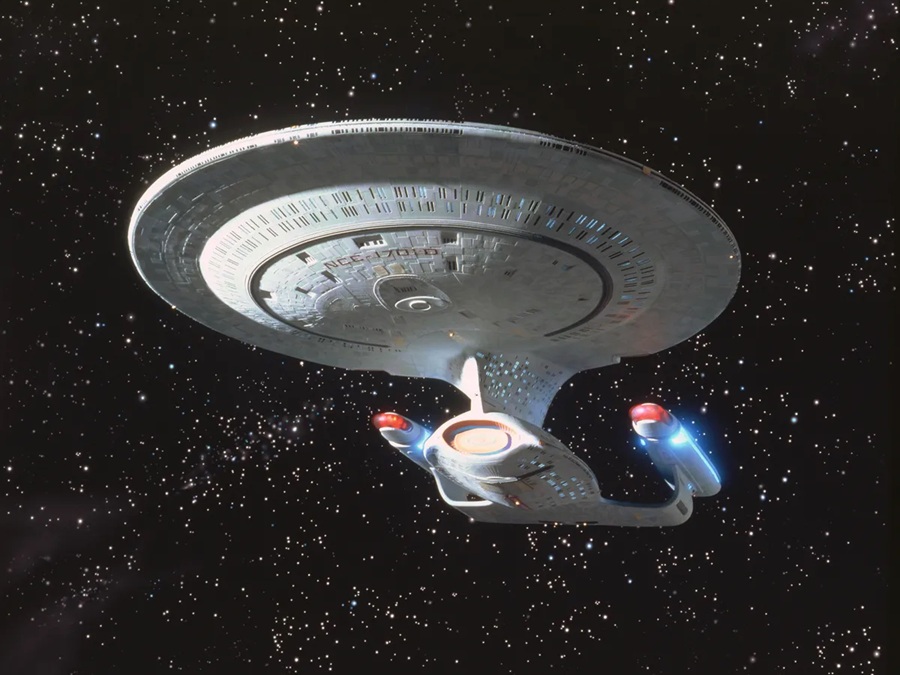My parents tell me that I declared my intention to become an astronaut at age four. Books about astronomy, space exploration, and science have always lined my bookshelves. Then, there was Star Trek. More specifically, Star Trek: The Next Generation.
There are many incarnations of Star Trek, each with its own identity, so one does need to specify. The original episodes first appeared in 1966. The Next Generation was the franchise’s return to television in 1987, featuring Patrick Stewart as Capt. Jean-Luc Picard; it ran until 1994.
The show’s optimism appealed to me. In it, humanity had a future, and it was a good one. It convinced me that a United Federation of Planets was possible: hundreds of alien species peaceably co-existing and cooperating, making collective decisions based on logic and science, with the greater good as the overarching moral guidepost. The ethics, rationality, and humanism I saw there contrasted sharply with the world I was beginning to know. Here we were on Earth, struggling to transcend our worst self-destructive instincts. Star Trek offered hope.

More than 20 years had passed since I last watched The Next Generation. But this summer, on a whim, I decided to start at the beginning and watch every episode — all 176 of them. I expect this journey to take a year or two. And then there’s Deep Space Nine and Voyager, two subsequent Star Trek series that launched in the ’90s, and which share the same ideals. This might keep me busy for a while.
This time around, the show offers a kind of refuge. The contrast between the rational, ethical world of Star Trek and our world today is even sharper than it was in the 1980s. If despair and nihilism whisper seductively, this is the counter-narrative to the lies some would have us believe about each other and ourselves: that might is right, that the other is the enemy, and that domination and submission are the currency of all relationships, personal, economic, social, international.
Capt. Picard, well known for delivering powerful moral clarity through the medium of Stewart’s classical theater training, would have much to say against these amoral notions.
Actually, if you’ll forgive a deep dive into the world of Star Trek, he would have nothing at all to say to us. The Prime Directive would apply in the case of Earth today, a principle of the fictional United Federation of Planets that forbids interference in less advanced societies.
No, Capt. Picard would observe us at a distance and watch sadly as we flail about. He would express regret to his crew while telling them they cannot intervene, even with the best intentions. They can only hope that we might survive the impending crises and overcome our own savagery.
Maybe the Federation will check back in a century or two to see how we’re doing and if we’re ready for first contact.
Star Trek often comes up when astronauts, scientists, and aerospace engineers write or speak about why they chose the paths they did.
When The Next Generation aired, few imagined a near-future of space exploration that would be characterized by commercial opportunity and personal aggrandizement. I certainly did not. What else besides a love of science and spirit of exploration would drive us “to boldly go where no one has gone before” — the mission of TNG’s crew, spoken by Capt. Picard over the opening credits of every episode.
But here we are. Now it’s billionaires who push us forward into space, while NASA struggles to justify itself to elected leaders most notable for their ignorance, brutishness, and indifference to the human spirit. It’s all the perfect antitheses of Star Trek.
We do still have The Next Generation, and Deep Space Nine, and Voyager. Maybe the shows will continue to inspire people to pursue science, exploration, and the betterment of society for all. And at least we can still look up into the sky.
A few nights ago, at Newcomb Hollow Beach in Wellfleet, Perseid meteors streaked overhead, the summer constellations sparkled, and a huge orange moon rose, its light glittering over the Atlantic. And between the known stars was a dark void. In that emptiness, I see possibility and hope. As Capt. Picard would say, “Make it so.” Clear skies!
